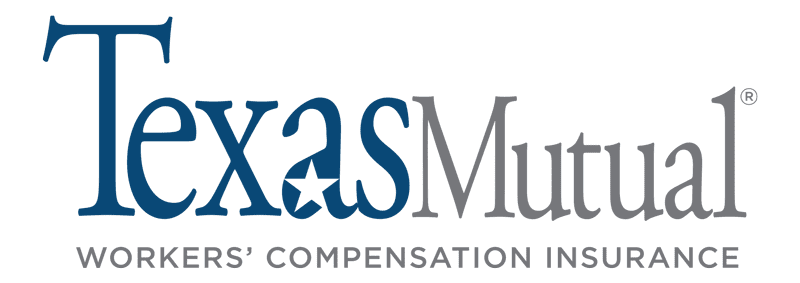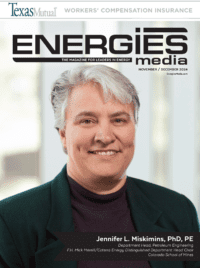Rebecca Ponton: Please explain what workers’ compensation insurance and Texas Mutual have to do with the oil and gas industry?
Lisa Evans: Insurance might not be the first industry that comes to mind when thinking about oil and gas, but it’s a crucial component. Every industry, especially one as inherently risky as oil and gas, relies on robust risk management strategies to ensure the safety of employees. At Texas Mutual, we specialize in workers’ compensation insurance, ensuring that if someone gets hurt on the job, they receive the medical attention and support they need to return to work.
My connection to this industry is personal. I grew up in Brazos County, surrounded by oil and gas operations. My stepfather, a swab and workover rig operator in the ‘70s and ‘80s, was involved in a serious accident at work. Fortunately, workers’ compensation covered his medical bills and provided income while he recovered, an experience that cemented my understanding of the critical role insurance plays in high-risk industries.
RP: What other connections do you see between these industries?
LE: There are significant parallels between oil and gas and insurance, particularly in the progress women have made in leadership roles within both industries. When I began my career in the mid-90s, there were very few female executives in either field. Today, women are leading companies, managing critical projects and influencing policies across sectors, including oil and gas. This progress is a testament to the resilience and determination of women who refused to be limited by societal expectations.
Another parallel is how both industries are perceived by the public. Insurance has experienced its share of bad press, and we all know the current animosity toward “big oil.” But it’s important to look beyond the headlines. There are great careers in both industries, and both contribute significantly to our communities. For instance, 96% of the products we use daily are made possible by oil and gas.
Public perception often overshadows the contributions of these industries. In insurance, we often deal with the misconception that we are merely a business of denying claims. Similarly, the oil and gas industry faces criticism without acknowledgment of its role in powering the modern world.
RP: How are you involved with the energy sector in your current role?
LE: At Texas Mutual, I’m responsible for our safety group programs, which reward businesses that maintain safe work environments. One of our most valued partnerships is with the Texas Oil and Gas Association (TXOGA). For over 20 years, Texas Mutual and TXOGA have worked closely to provide member companies access to the TXOGA Workers’ Compensation Safety Group, exclusively with Texas Mutual. This longstanding collaboration has not only reinforced safety standards across the industry, but has also resulted in millions of dollars of savings for both large and small businesses across Texas.
 Safety is at the core of what we do, and it’s especially critical in an industry like oil and gas, where the risks are so high. Through our safety group program, we provide companies with the tools and resources they need to create safer work environments. This support includes access to Texas Mutual’s robust safety team, industry-specific resources, and bi-monthly TXOGA Safety Talks, which offer practical safety tips and discussion points for workplace meetings.
Safety is at the core of what we do, and it’s especially critical in an industry like oil and gas, where the risks are so high. Through our safety group program, we provide companies with the tools and resources they need to create safer work environments. This support includes access to Texas Mutual’s robust safety team, industry-specific resources, and bi-monthly TXOGA Safety Talks, which offer practical safety tips and discussion points for workplace meetings.
These safety initiatives are more than just programs; they are lifelines that can mean the difference between a safe work environment and a potential tragedy. Our goal is to help companies proactively manage risks and protect their most valuable asset: their people.
RP: In addition to the economic impact, how does the oil and gas industry benefit Texas and Texans?
LE: The oil and gas industry is vital to Texas, not just economically, but in the way it impacts every aspect of our daily lives. According to TXOGA, the industry supports over 480,000 direct jobs and contributed $26.3 billion in state and local taxes and royalties in fiscal year 2023 alone. These funds are critical for public services like schools, roads and first responders. It’s also impressive to note that Texas produces over 40% of the nation’s oil and nearly 30% of its natural gas.
Beyond these contributions, the industry plays a pivotal role in education. TXOGA and its members are heavily involved in promoting STEM education, which is essential for preparing the next generation of industry leaders. Programs like the Mobile Energy Learning Unit (MELU), which visits elementary schools across Texas, are instrumental in sparking interest in the oil and gas industry among young students.
As part of a recent MELU tour, TXOGA and a member-company sponsored a contest that challenged students to learn more about the industry by drawing everyday items that are created from oil and natural gas. Winning students were treated to an all-expense paid field trip to Austin that included a visit to the Bullock Texas State History Museum’s Texas Oil and Gas Exhibit, followed by a guided tour of the Texas State Capitol. By providing hands-on learning experiences, these programs help students understand the importance of oil and gas in their daily lives and encourage them to consider careers in the industry.
The oil and gas industry’s contributions to education and workforce development cannot be overstated. It’s not just about extracting resources; it’s about investing in the future of Texas by ensuring that the next generation is well-equipped to take on the challenges and opportunities that lie ahead.
RP: Any final thoughts on the relationship between insurance and oil and gas?
LE: Both industries are foundational to our economy and society. They might operate in the background, but their impact is profound. Whether it’s providing the energy that powers our lives or ensuring that workers are protected on the job, these industries are essential. I’m proud to work in a field that supports safety and well-being, and I’m committed to continuing our work at Texas Mutual to strengthen the ties between insurance and the industries we serve, including oil and gas.
As we look to the future, it’s clear that the relationship between insurance and oil and gas will continue to evolve. Both industries will need to adapt to new challenges, from technological advancements to changing regulatory landscapes. However, one thing remains constant: The need to protect and support the people who work in these critical fields. At Texas Mutual, we’re dedicated to doing just that – ensuring that every worker goes home safe at the end of the day and that every business has the support it needs to thrive.
Rebecca Ponton is the editor in chief at U.S. Energy Media and author of Breaking the Gas Ceiling: Women in the Offshore Oil and Gas Industry. She is the publisher of Books & Recovery digital magazine.




